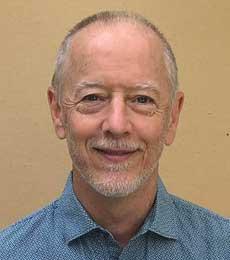
Richard J. Youle, Ph.D.
NIH Distinguished Investigator
Biochemistry Section, Surgical Neurology Branch (SNB)
NINDS
Research Topics
Part of the Surgical Neurology Branch, the Biochemistry Section, led by Dr. Youle, currently focuses on discovering the functions and interrelationships among proteins mutated in familial Parkinson's disease and ALS. This has led the unit to explore the molecular mechanisms of autophagy, mitochondrial dynamics, apoptosis and mitochondrial quality control.
Using biochemical, cell biological and animal studies we have found that the products of two genes mutated in autosomal recessive forms of Parkinson's disease, PINK1 and Parkin, normally work together in the same pathway to govern mitochondrial quality control, bolstering previous evidence that mitochondrial damage is involved in Parkinson's disease. PINK1 is a kinase located on mitochondria, and Parkin is an E3 ubiquitin ligase normally located in the cytosol. When mitochondria are damaged, PINK1 accumulates on the outer mitochondrial membrane where it phosphorylates ubiquitin chains. These phosphorylated ubiquitin chains on the outer mitochondrial membrane bind to cytosolic Parkin and activate Parkin's E3 ubiquitin ligase activity yielding a feedback amplification loop that drives mitophagy to completion. These finding reveal a cell biology pathway where Pink1 function is paired with that of Parkin supporting the model that mutations that inactivate this quality control pathway leads to parkinsonism.
Downstream of PINK1/Parkin the machinery that mediates autophagosome recognition of damaged mitochondria links this pathway to genes mutated in ALS. Using CRISPR/Cas9 to knock out a series of autophagy receptors reveals their function and hierarchy in autophagosome engulfment of mitochondria. For example, Optineurin and NDP52 bind to ubiquitin chains on mitochondria and also recruit autophagy machinery proteins, including the upstream kinase Ulk1 and the downstream autophagosome marker, LC3, to induce autophagosome engulfment of the damaged mitochondria. Animal models that display mitochondrial damage require endogenous Parkin to prevent domaminergic neuron loss and movement disorders. Interestingly, in a murine model of mitochondrial damage, the product of the kinase PINK1 (phospho-S65 ubiquitin) increases several fold in the cortex, representing a biomarker of PINK1 activity. We are further examining biomarkers of PINK1/Parkin activity in vivo to define roles of mitochondrial quality control in a series of physiological and pathological states.
Biography
Dr. Youle received an A.B. degree from Albion College and his Ph.D. degree from the University of South Carolina where he worked on the protein toxin ricin. He joined the lab of David Neville at the National Institute of Mental Health for postdoctoral work on engineering new cell-type-specific protein toxins. He joined the Surgical Neurology Branch of NINDS in 1985 as a principal investigator where he has developed and moved into clinical trials new treatment strategies for brain tumors. His lab subsequently explored the molecular mechanisms of programmed cell death showing how Bcl-2 family members participate with mitochondria to control cell survival. Most recently his lab has discovered functions and interrelationships among proteins mutated in familial Parkinson's disease. His current work focuses on molecular mechanisms of autophagy, mitochondrial quality control and neurodegenerative disorders.
Watch a 2021 video, Distinguished Alumni from Albion College.
Selected Publications
- Fischer TD, Wang C, Padman BS, Lazarou M, Youle RJ. STING induces LC3B lipidation onto single-membrane vesicles via the V-ATPase and ATG16L1-WD40 domain. J Cell Biol. 2020;219(12).
- Sarraf SA, Shah HV, Kanfer G, Pickrell AM, Holtzclaw LA, Ward ME, Youle RJ. Loss of TAX1BP1-Directed Autophagy Results in Protein Aggregate Accumulation in the Brain. Mol Cell. 2020;80(5):779-795.e10.
- Vargas JNS, Wang C, Bunker E, Hao L, Maric D, Schiavo G, Randow F, Youle RJ. Spatiotemporal Control of ULK1 Activation by NDP52 and TBK1 during Selective Autophagy. Mol Cell. 2019;74(2):347-362.e6.
- Lazarou M, Sliter DA, Kane LA, Sarraf SA, Wang C, Burman JL, Sideris DP, Fogel AI, Youle RJ. The ubiquitin kinase PINK1 recruits autophagy receptors to induce mitophagy. Nature. 2015;524(7565):309-314.
- Kane LA, Lazarou M, Fogel AI, Li Y, Yamano K, Sarraf SA, Banerjee S, Youle RJ. PINK1 phosphorylates ubiquitin to activate Parkin E3 ubiquitin ligase activity. J Cell Biol. 2014;205(2):143-53.
Related Scientific Focus Areas


Molecular Biology and Biochemistry
View additional Principal Investigators in Molecular Biology and Biochemistry

This page was last updated on Wednesday, May 28, 2025